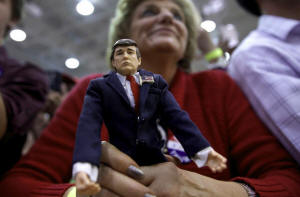|
The Trump tightrope: Republicans weigh
response with eye toward future
 Send a link to a friend
Send a link to a friend
 [October 14, 2016]
By James Oliphant [October 14, 2016]
By James Oliphant
WASHINGTON (Reuters) - With Donald Trump’s
U.S. election prospects dimming and controversy swirling around him,
future Republican presidential hopefuls may be weighing whether standing
by their man is the savvy move.
Party strategists fear voters fleeing Trump will also fail to support
Republican candidates for the U.S. Senate and House of Representatives,
possibly costing the party control of Congress.
If Trump loses the Nov. 8 presidential election to Democrat Hillary
Clinton, his polarizing candidacy may reverberate well past 2016,
tarring future Republican White House hopefuls, potentially including
House Speaker Paul Ryan, U.S. Senator Marco Rubio and Indiana Governor
Mike Pence, Trump’s vice presidential running mate.
Trump was struggling in opinion polls before a 2005 video released last
week showed him talking in sexually aggressive terms about seducing
women. Afterward came stories in several news outlets alleging Trump had
inappropriately touched women.
Trump has angrily denounced the stories, the media and Republicans who
have declined to support him.

"The brand has already been irrevocably damaged. There’s nothing we can
do in the short term,” said Doug Heye, a former top official with the
Republican National Committee. Looking to the 2018 U.S. congressional
election and the 2020 presidential election, Heye said: “In two to four
years, the stain on our party’s soul won’t be washed away.”
To be sure, a Trump loss is no guarantee the Republicans would suffer
for long. Four years after Barry Goldwater's massive loss in 1964,
Richard Nixon staged a Republican comeback. The conservative Heritage
Foundation think thank has said Goldwater launched a shift to the right
that would end half a century of liberal dominance in American politics.
DEFINING MOMENT
For Republicans weighing a run for president in four years, deciding
whether to back Trump may be a defining moment equal to what politicians
faced in 2002 when they decided whether to back Republican President
George Bush's Iraq invasion. By 2006, public sentiment had turned
harshly against the Iraq war, some Republican politicians lost their
jobs, and Democrats seized both the House and Senate.
Republican presidential hopefuls of the future may be asking: How can I
be loyal and stand by Trump while at the same time expand the party's
base to include sectors the candidate has alienated?
More broadly, they may ask: What's the right side of history?
Trump’s candidacy has attracted passionate support from a core group of
voters but also driven away some moderates and independents. Republicans
such as Heye fear Trump, who already has alienated large populations of
Hispanic voters because of his hard line on immigration, will cost the
party a generation of women voters as well.

Ryan, Rubio and Pence all have, to some degree, sought to distance
themselves from Trump. Ryan this week told colleagues he would no longer
publicly defend Trump, in essence washing his hands of him. Rubio, who
ran against Trump in the Republican primary and is fighting for
re-election in his home state of Florida, has criticized Trump’s remarks
about women, but has not withdrawn his support.
Pence is routinely forced to answer for his running mate’s conduct, but
managed at last week’s vice presidential debate to outline policy
differences with him.
If Trump leads the party to crushing defeat next month, he may for years
haunt Republican office-holders who supported him.
[to top of second column] |

A supporter of Donald Trump holds a Trump doll as she listens to him
speak at a campaign rally in Ambridge, Pennsylvania. REUTERS/Mike
Segar

“I predict a chaotic round of finger pointing after the election, as
people try to justify their position,” said Jim Manley, a former top
aide to Senate Minority Leader Harry Reid who witnessed the
Democratic wave in 2006 first-hand.
Democrats are trying to link vulnerable Senate candidates to Trump
at every turn. On Thursday, the advocacy group American Bridge
highlighted Trump’s praise of Rubio on local Florida television,
even as Rubio has avoided appearing at any Trump events in the
state. Clinton on Twitter this week noted that Ryan has not recanted
his endorsement of Trump.
'TOUGH' FOR PENCE
Strategists say Pence would have the hardest time emerging from
Trump’s shadow. “I think for Pence, it’s really tough,” said
Republican operative Liz Mair.
Pence excited some conservative voters with his debate performance.
A Politico/Morning Consult poll taken afterward showed him as the
top choice for 2020 among Republicans, at 22 percent. Ryan, Texas
Senator Ted Cruz and Rubio followed.
Cruz, who was Trump’s leading rival for the 2016 Republican
nomination, illustrated the perils of trying to respond to Trump’s
candidacy. After holding out, Cruz endorsed Trump last month, just
before the candidate went into a public-opinion tailspin.
Cruz and Rubio, as well as Ryan, have come under fire from some
Republicans for appearing to waver on Trump, at times standing by
him and at other times criticizing him.

"People that waffle are going to have more trouble than people who
pick a side,” said Brian Bartlett, a Republican strategist who
worked for Mitt Romney’s 2012 presidential campaign.
He said Ohio Governor John Kasich, another presidential candidate
who consistently refused to endorse Trump, may emerge in the
strongest position of all. Other potential 2020 contenders, such as
South Carolina Governor Nikki Haley, may benefit from not being on
the ballot this year, thus being spared from being asked constantly
about Trump while campaigning.
But that assumes the anti-Trump forces in the party hold sway after
the election. There will still be a significant chunk of the party
who will view Trump’s critics as disloyal, Bartlett warned, which
may put some establishment politicians on the spot to explain why
they did not do more to support the nominee.
(Writing by James Oliphant; Editing by Caren Bohan and Howard
Goller)
[© 2016 Thomson Reuters. All rights
reserved.]
Copyright 2016 Reuters. All rights reserved. This material may not be published,
broadcast, rewritten or redistributed.
 |